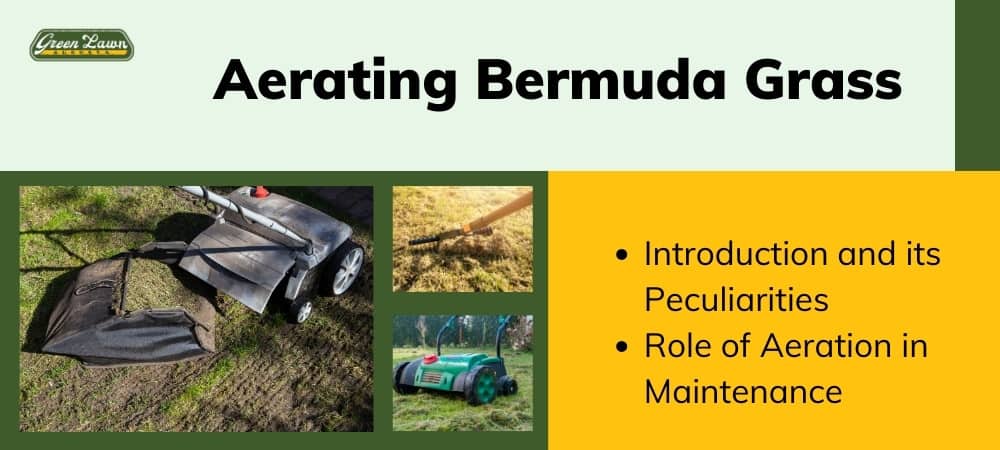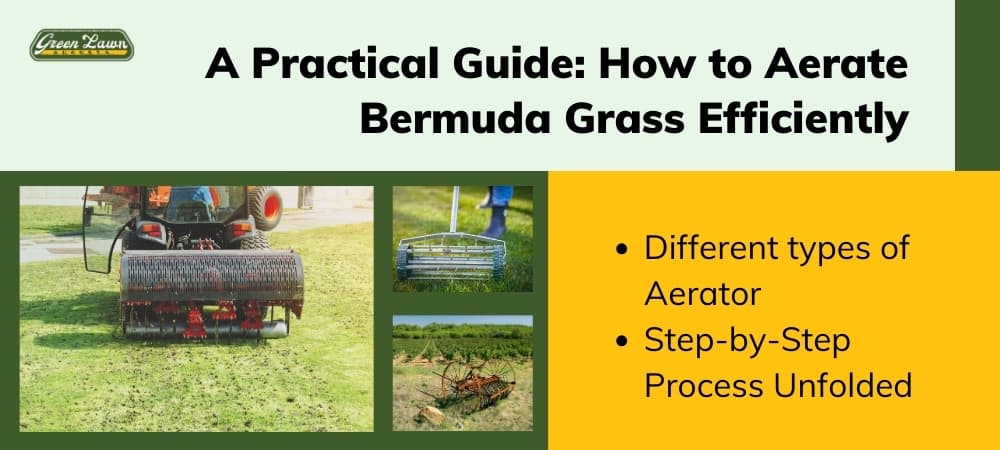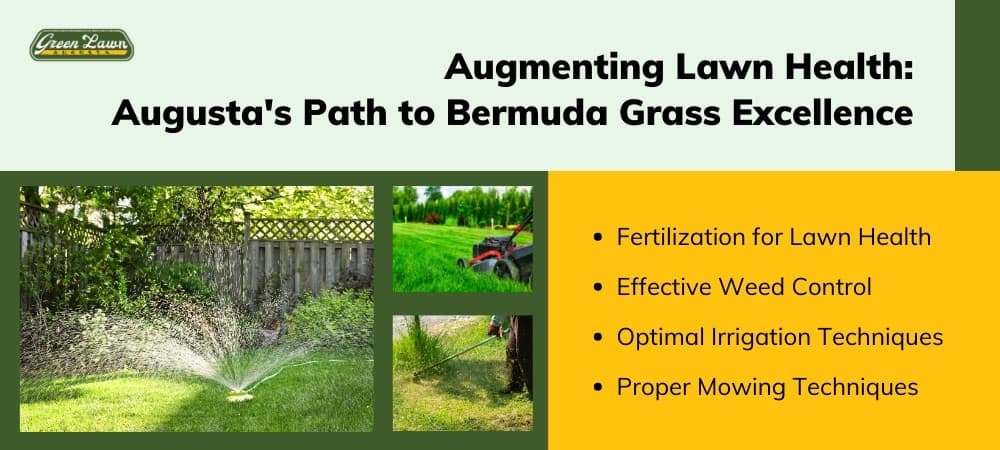Aerating your Bermuda grass in Augusta is key to maintain a healthy lawn, but the timing is crucial. Do you know the best time for lawn aeration?
We’re here to guide you on each part of the process, guaranteeing a greener and healthier lawn.
Table of Contents
ToggleAerating Bermuda Grass in Augusta

Before you start Bermuda grass care in Augusta, it requires understanding of the characteristics and the best maintenance practices. This tough, versatile grass is preferred due to its notable ability to thrive in warm climates.
Everything You Need to Know About Lawn Aeration in Augusta. It’s underestimated yet a crucial step that can greatly improve the health and look of your yard.
Introduction to Bermuda Grass and its Peculiarities
Bermuda grass stands out with its distinct features that differ from other lawn grasses.
Distinctive Features of Bermuda Grass:
This is a robust warm-season grass, noted for its dense mat-like layout, able to endure extreme heat conditions.
Its survival and growth are dependent on specific care practices.
Maintenance and Care of Bermuda Grass:
Comprehending its unique traits is crucial for preserving its vigor and vitality.
When its growth rate diminishes in winter, it requires particular attention.
Growth Pattern and Unique Traits of Bermuda Grass:
Unlike other grass types, this variety proliferates rapidly through rhizomes and is stolen.
Due to its high growth speed, it necessitates regular mowing.
The Vital Role of Aeration in Bermuda Grass Maintenance
Let’s discover the scientific principles behind the technique used to keep lawns healthy.
Unveiling the Science of Aeration
Here is how the process can be advantageous for your Bermuda grass:
Advantages: Enhanced absorption of nutrients and alleviation of soil compaction.
Methods: Core aeration and spike aeration
Tools: Hand-operated aerators, gas-driven aerators
Outcomes: Improved lawn vitality and robustness.
Studies indicate that regular aeration leads to more robust lawns.
This knowledge sets the stage for our subsequent discussion–identifying the optimal time to aerate Bermuda grass in Augusta.
Determining the Perfect Timing for Aerating Bermuda Grass in Augusta

Understanding the growth cycle of Bermuda grass is vital when determining the ideal time for aeration.
Let’s determine the best time to maintain your lawn in Augusta for optimal health and growth of your Bermuda grass.
When to Aerate: Aligning with Bermuda Grass’s Growth Cycle
Grasping the local weather patterns is paramount in establishing optimal lawn care practices, with Augusta’s distinctive climatic conditions playing a substantial part.
Specific regional conditions can impact your Bermuda grass’s growth cycle and accordingly dictate the timing of your aeration procedures.
Factoring in Regional Specifics: Why Augusta’s Climate Matters
Comprehending the regional characteristics and the impact of the climate is essential to utilize Augusta’s weather effectively because it significantly influences the optimal procedures for aerating. Here are the reasons why:
Regional Specifics:
State of the soil– Augusta’s soil has high clay content, which can compact and hinder air, water, and nutrient circulation to the grassroots. Aerating helps loosen compacted clay soils.
Type of grass:
Augusta lawns are predominantly Bermuda grass. This warm season grass thrives in the southern climate but has specific aeration requirements.
Weather Impact:
Precipitation cycle – Augusta experiences higher rainfall in winter and spring, with hot and humid summers. Aerating before peak growth periods utilizes natural rainfall to carry nutrients into the soil.
Range of temperature:
With temperatures varying from average highs of 90°F in summer to lows of 45°F in winter, the ground can freeze during colder months, which impacts aeration timing.
Responsiveness of Bermuda Grass & Aeration Factors:
Rate of growth – Bermuda grass grows most vigorously in summer and spring when temperatures are highest. Aerating in early summer allows for rapid recovery.
Perfect timing for aeration– The peak time to aerate Bermuda grass is early summer as temperatures rise and rainfall decreases. This maximizes grass growth and recovery post-aeration.
A Practical Guide: How to Aerate Bermuda Grass Efficiently

Aerating your Bermuda grass requires careful selection of an appropriate aerator. This choice greatly influences the health and aesthetics of your lawn.
The next part will detail the features and benefits of different aerators, enabling you to make an informed decision tailored to your unique requirements.
Aerator Types: Making an Informed Decision
Several types of aerators are available, each with pros and cons to consider:
Core Aerators: Core aerators effectively penetrate dense clay soils in Augusta, creating channels for air, water, and nutrients to reach grass roots.
Solid Tine Aerators: Spike aerators are less disruptive for Bermuda grass recovery but do not provide lasting aeration in dense soils. They are mainly used for the pre-growing season.
Slicing Aerators: Blades create slits for air and water flow in soil but may not be as effective for relieving compaction in the clay soils of Augusta. Ideal for new Bermuda lawns.
Power Rakers: Rotating blades scarify soil, remove debris, and prepare for seeding. But It is not ideal for routine aeration of established Bermuda lawns.
Rolling Drum Aerators: Rolling drum aerators provide efficient coverage for large Bermuda grass areas. But the drums can further compact very wet soils, so timing based on soil moisture is important.
Core aerators provide Bermuda grass’s most complete soil aeration with long-lasting compaction relief.
But soil conditions and lawn size should inform selection. Experts can recommend the ideal aerator for specific needs. Proper use is key.
Step-by-Step: The Aeration Process Unfolded
Understanding each phase of the aeration process can enhance its overall effectiveness.
- Advantages of Aeration: It amplifies the absorption of water, nutrients, and oxygen.
Be aware and avoid prevalent errors like excessive aeration.
- Aerator Types: Select core, spike, or plug aerators.
If problems arise, check for blunt tines.
- Aftercare Following Aeration: Ensure thorough watering and fertilizer application.
Not watering sufficiently is a common oversight.
These suggestions can significantly elevate the health of your Bermuda grass.
Augmenting Lawn Health: Augusta’s Path to Bermuda Grass Excellence

Enhancing the health of your Augusta lawn, particularly when nurturing Bermuda grass, requires more than frequent aeration. Various methods can transform an average lawn into a lush green sanctuary.
Fertilization is essential to lawn aeration in Augusta, GA. It restores nutrients and promotes vigorous growth, but it must be done carefully. Over-fertilization can damage your grass, whereas insufficient fertilizer leaves it undernourished. Therefore, a thorough soil test is indispensable to ascertain nutrient content and pH balance, which directs effective fertilization.
Another crucial aspect is weed control. Weeds are invasive and compete with grass for resources, making them challenging to handle. The strategic use of herbicides and preventive actions like maintaining a dense lawn cover can aid in controlling them.
Irrigation techniques greatly influence lawn health. Bermuda grass benefits from infrequent deep watering rather than regular shallow watering. This method encourages the growth of deep roots and strengthens the grass’s drought resistance.
Moreover, pay attention to correct mowing techniques; trimming your lawn regularly to the appropriate height encourages thicker growth and naturally deters weeds by preventing sunlight from reaching weed sprouts.
FAQs on Aerating Bermuda Grass
When is the optimal time to aerate Bermuda grass in Augusta?
The best time to aerate Bermuda grass in Augusta is during the growing season, usually from late spring to early summer when the grass can heal and fill in the open areas after soil plugs are removed.
How frequently should I aerate my Bermuda grass lawn in Augusta?
You should aerate your Bermuda grass lawn in Augusta at least once a year. However, if your lawn is heavily used or has a clay soil type, it may benefit from aeration twice a year.
Is it necessary to water my Bermuda grass before aeration?
3. Yes, watering your Bermuda grass thoroughly one to two days before aerating is beneficial, as moist soil allows the aerator to penetrate the soil more deeply.
Is it possible to aerate Bermuda grass during the summer season in Augusta?
Yes, it’s possible to aerate Bermuda grass during summer in Augusta, as this is the period when the grass is actively growing. However, avoid aerating during dry or drought conditions.
What kind of aerator should I use for Bermuda grass?
5. A core aerator is the best for Bermuda grass as it removes small cores of soil and thatch from the lawn, allowing water, air, and nutrients to reach the grassroots efficiently.
How soon after aeration can I mow my Bermuda grass lawn?
6. You should wait 48-72 hours after aeration before mowing your Bermuda grass lawn to allow the grass to recover.
How can I determine if my Bermuda grass in Augusta requires aeration?
If your Bermuda grass in Augusta has a spongy feel and dries out easily, or if water pools on the surface, it likely needs aerating.
How deep should the aeration process be for my Bermuda grass lawn?
To ensure proper penetration and maximum effectiveness, you should aerate your Bermuda grass lawn to a 2-3 inches depth.

